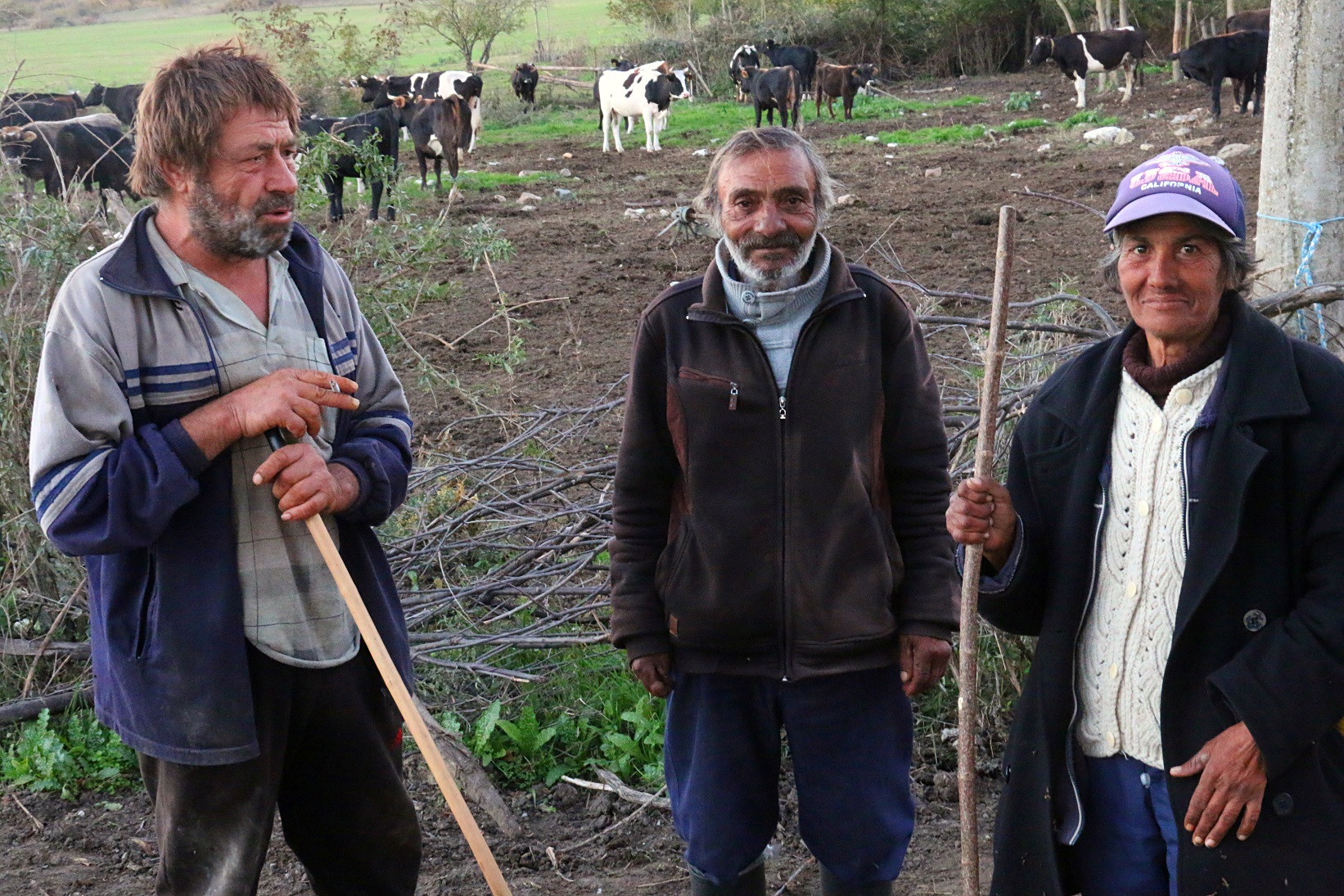
05 May 13: Fugitives & jackals (Bulgaria)
Harmanli, Bulgaria to Hamzabeyli, Turkey (2 – 8 Nov)
Total miles cycled: 2,130 (3,428km)
Thigh status: Barrage balloon
As soon as I arrive in Harmanli, I’m approached by a small, swarthy man with a wolfish grin. ‘Hello, beautiful,’ he says. ‘Can I show you around?’ It’s probably not the most attractive offer I’ve had all week — that came from the farmer in Stoykovo who asked me to help him milk his longhair goat — but it turns out he’s exactly what I’m looking for: a Syrian refugee from the camp. We agree to meet in an hour.
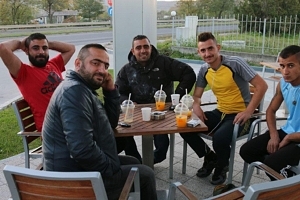
A group of Kurdish refugees from Syria, who are desperate to flee to western Europe.
The man, H, is a Kurd and a dual Syrian/Turkish national. Three years ago, most refugees here were African and Afghan, he says, though most now are Syrian. Only a few hundred remain as so many have fled to Germany. This is the destination of choice, he tells me, as most other countries send people back to the first place they sought asylum, under the EU Dublin Regulation.
H is 32 and is desperate to flee too. In 2013, he made it to Germany via Serbia, Hungary and Austria, and applied there unsuccessfully for asylum. He then travelled to the Netherlands, where he stayed for 18 months before being sent back to Bulgaria under the Dublin rules.
H tells me he left Syria because of the war, and he cannot return to Turkey because he was caught with a fake visa for Norway and absconded. The story later changes. His uncle killed someone, he confides, in revenge for an attack over money. The victim’s family then turned on the uncle, prompting several of his family to flee. ‘Life is cheap for Kurds,’ he says.
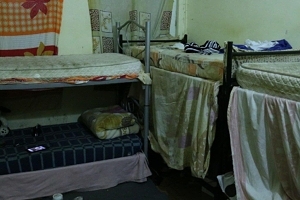
A bedroom inside the Harmanli refugee camp: three bunk beds squeezed inside with dirty sheets and no room for other furniture or belongings.
I am introduced to some of H’s Kurdish friends, including a flashy fellow in luminescent yellow Adidas trainers who drives a black Mercedes 4×4 and makes a living as a human trafficker. We drink tea and they tell me how they hate Islamic State (‘they try to convert everyone who isn’t Muslim’), but have no problem with Assad. This surprises me: the Kurds are the largest ethnic minority in both Syria and Turkey, and have been discriminated against in both for generations. But, as the maxim goes, your enemy’s enemy is your friend, and IS is proving an effective if unsettling matchmaker across the world.
I am told how the flight to western Europe works. A ‘chief’ (like the Adidas guy) is paid to organise the entire trip, and everyone travels at night in a group. It costs €600-800 to cross the Bulgarian/Serbia border and thousands for the trip as a whole. It’s much harder now than it used to be, apparently. A 30km wall has been built between Bulgaria and Turkey, and is due to expand further, while guards have become more militant.
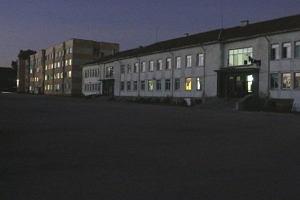
The main lodgings inside the camp.
We wander around town and end up in a smoky, sour-smelling bar. I order a coffee and buy H a beer. He would reciprocate, he says, but he’s squandered €12,000 on gambling and is waiting for money to be sent from his family. I humour him, but am sure he’s lying. Gambling debts are clearly more acceptable to his male ego than admitting he’s poor. ‘We get nothing from Bulgaria,’ he says. ‘But we’re ok. We’re men; we have money.’
We meet another group of young Kurds sitting outside a petrol station. They all have shaved heads and tattoos, but are welcoming and talkative. They buy me a juice without me asking and all want to know the ins and outs UK visa rules – about which I know nothing. What do they do here for fun, I ask? Talking, smoking, exercising, reading, watching TV, working, they tell me. So you’re allowed to work, I ask? They look at each other. Yes, they say. Kind of.
Then H takes me to the camp. I am not confident of success. The general public is not allowed inside and I’ve heard Bulgarian camps are notoriously difficult to enter. But the guard is a Bulgarian Turk and H sweet talks him in Turkish. ‘We’re in!’ he tells me jubilantly. ‘We’ve got 15 minutes.’
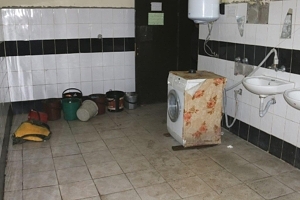
The communal washroom, where several taps are on and overflowing onto the floor.
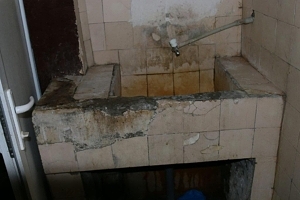
A sink inside the communal toilet in the refugee camp, covered in mould.
Inside, we walk into a vast, bleak courtyard, then past rows of grim, corrugated metal porta-cabins where people used to be housed. These lead us to a second courtyard beside a large concrete block. Inside, it’s worse than I imagined. The floor is mottled with stains and puddles, while the bathroom is filthy, with several taps running and flooding the sinks. ‘Be careful of the rats,’ H calls to me encouragingly. ‘They’re as big as dogs.’
We go to H’s room, which he shares with five other men in three bunk beds. It’s small and grimy, and I feel a deep, cloying heaviness just looking at it. Then our 15 minutes are up and we rush back to the entrance. On our way out, H suddenly reveals his money hasn’t come through. Can he have 20 lev (€6) to catch the bus tomorrow? I’m hesitant, but agree. I know he’s a bullshitter, but he’s still a bullshitter in need, I reason.
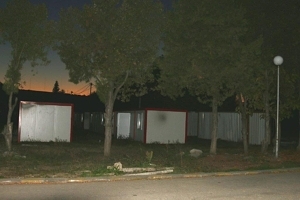
What look like windowless portaloos, but were apparently used as lodgings for refugees when the camp was overcrowded.
The next day, I hear that H never made the bus. He overslept, he says. And he’s also in love with me. I spend the day ignoring his ever-more-persistent calls and instead explore the town. Harmanli is an odd place, pretty in parts but with a stale inertia at its core. Young men in jeans and leather jackets slump in doorways, skin ashen, gaze brittle, living life in the cracks.
Back at the hotel, there’s a knock at my door. It’s H. His eyes are bloodshot and bulging. ‘Where have you been?’ he demands. ‘Why didn’t you reply to me?’ I’m shocked he’s found me, but try to remain composed. ‘I don’t want to see you,’ I tell him. ‘You’re a liar. You say you need to leave urgently, but you miss the bus. You say you have lots of money, yet need more. You say you’re a Syrian refugee, but you’re a Turkish fugitive. What’s the truth?’
To get him out of my room, I agree to have a final drink in a bar beside the hotel. When we arrive, he immediately orders a double vodka. He tells me he loves me, then slightly undermines the sentiment by saying he loves ‘all British women’. Have I ever met a man like him before, he asks? Small, sleazy and desperate, I reply? Plenty.
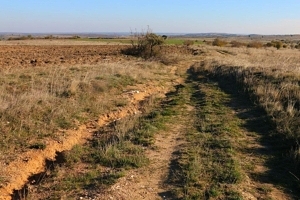
15km later, the romance of the route starts wearing a little thin
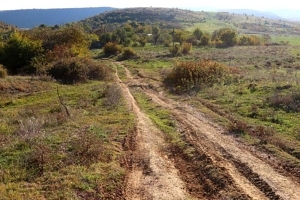
The ‘road’ to Matochina ghost-town, which I start down with gusto.
Gradually drunker and more incoherent, H tells me he respects me deeply. And wants to sleep with me. That’s sweet, I say, and will never happen in a million years. He shifts tack and tells me he doesn’t respect me and there’s something funny about my eyes. I say thank you and leave. As I rush off, he follows me shouting: ‘I will kill you! And have sex with you!’ – in that rather macabre order. Then I dart into the hotel and up to my room, locking the door behind me. A few seconds later, I hear crashes and a scream below. And then silence.
Later, I discover that H lashed out at the receptionist and was arrested. At first I feel guilty. He’s not a malicious man, I think; just a desperate, misguided one. But I needn’t have worried. A few days later, I hear he made it to Munich after all. And he’s sorry. I ignore him, but on some level I find I am pleased. Maybe, at last, he can sort his life out.
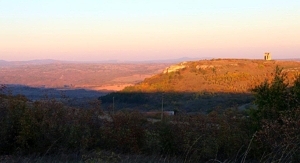
The ghost-town of Matochina overlooked by 4th century Bukelon ruins, as the sun dips low over the horizon.
From Harmanli, I set off on an ambitious 118km venture to see a ghost-town called Matochina near the Turkish border. It’s a long, hilly slog to get there, the last 15km along an almost impassable muddy track that flays my tyres and pummels my rump. Occasionally the mud switches to sand, and my wheels slip, sink and drag as I heave my way along.
Then, finally, the town emerges in the valley below, glowing dusky pink in the late afternoon light. The place looks eerily alive, but it’s a mirage of vitality; a cadaver enlivened by an embalmer’s brush. Only a tiny handful of residents remain, all of whom I meet outside the village shop (which doubles as cafe and bar): two old women, one elderly man and one ancient shepherdess.
After buying a lemonade for 7p (including complimentary chocolate), I have a swift nose around town. I visit the old school and museum, both boarded up, and the 4th century Bukelon ruins, reconstructed in the Late Middle Ages. There’s history and cultural significance here, in this dying ember of a town. But its heart and soul clearly departed years ago.
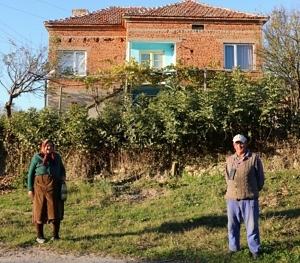
Two of the tiny handful of elderly residents still left in Matochina.
Then, as the sun kisses the horizon, I hit the road again. I am aiming for a town called Shtit, 20km away, where I hear there’s a guest-house. I start making my way across the empty, heavily rutted roads as the light gently fades — and suddenly find myself surrounded by five deranged hounds, barking and snarling in deafening chorus. Dismounting, I glare at them with what I hope to be a confident steeliness, but my heart is thumping wildly.
Then, just as the game seems up, a stick appears swinging wildly over my left shoulder and a shrill banshee cry fills the air. Three shepherds have come to my rescue! They holler and swipe fiercely at the dogs with their crooks, baring their yellowed teeth, while Maud and I cower helplessly on the sidelines. It’s truly a rule-by-fear world out here in the Bulgarian boondocks, and wimpish British bummlers seem to be at the bottom of the food chain.
After gratefully distributing a few cigarettes in exchange for my life, I push onwards. But it’s slow going. The sun is gone and the night drapes thick and black over the landscape. My lights barely make a dent and I can no longer see the gnarly cracks and craters in the road. Just please don’t get a puncture, I think to myself as I crawl tentatively along. Not now. Not here.
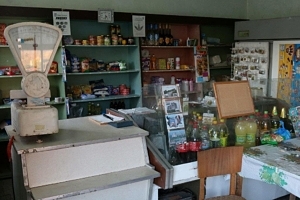
The local shop, which doubles as cafe and bar, selling basic foodstuffs, household goods, vodka and an impressive array of fridge magnets.
A few kilometres later, I get a puncture. I can’t believe it. It’s almost pitch black now, and deathly quiet except for a gentle breath of wind. I stop and dismount wearily – and it’s then I hear the jackals. They sound just metres away, cackling with maniacal glee. Oh god, I think. I’m going to die here. I’m going to end my days as some crass horror movie parody, aiming for a town called Shtit. I take out my thermos and have a large gulp of emergency Cabernet Sauvignon Khan Krum. I feel better and have another. What to do?
And then, suddenly, I am saved for the second time that day. A truck pulls up, and the man and young boy inside offer to give me a ride. They speak no English, but I can see the kindness in their eyes. Yes, I say. Yes yes yes!
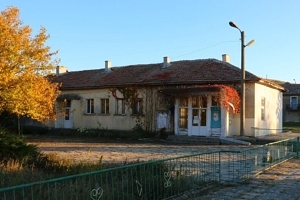
The abandoned school in Matochina, overgrown and boarded up.
Half an hour later, I am safely ensconced at the guest-house being revived by a bowl of tripe soup and pint of Johnnie Walker. It’s a homely place, designed like a log-cabin with an impressively eclectic range of décor, including weaponry, stuffed fish and paintings of bosomy women being slain in battle (see pics below). I am the only guest, and I spend a very enjoyable evening watching 90s pop on the Balkans’ answer to MTV with the owner: an octogenarian cowboy with a lustrous, Freddy Mercury-meets-Tom-Selleck moustache, who never utters a word, but occasionally comes over to squeeze my arm and top up my whiskey. It’s the perfect refuge and, after patching Maud, I zonk out exhaustedly under my cosy leopard-print sheets.
I leave early the next morning after a curious but not unwelcome breakfast of Coke and chicken soup (the cook misunderstands my clucking, which is meant to indicate an egg) – and swiftly get another puncture. I forgot to check the blasted tyre for thorns, I realise. Could I make any more mistakes in such a short period of time?
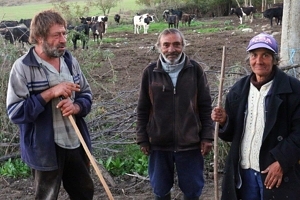
The shepherds who rescue me from being eaten by five rabid hounds en route to Shtit. I give them six cigarettes in exchange for my life.
As I fix it, a policeman pulls over to chat. They last caught a refugee 1.5 months ago, he tells me. Not too many come this way anymore. But I should be careful; there’s a lot of crime. The Roma are the worst. Last month one of them stole his bike. ‘Bulgaria’s dying,’ he says. ‘There’s no work. Gypsies and refugees get money, but not the old people who survive on €15 a month pension.’
The policeman says he only gets €300 a month. But he is proud of his country nonetheless. ‘Bulgarians were Thracians. We were fearless and fought the Romans.’
After the policeman leaves, I meet M, a Brit who moved to Bulgaria ten years ago as he was ‘sick of working and getting nowhere’. His wife died recently and he now spends his time trading cars and tending to his garden. I ask M about the Roma and he says they are ‘perfectly nice’. ‘If you are doing a deal they might try to fleece you, but otherwise there’s no problem,’ he says.
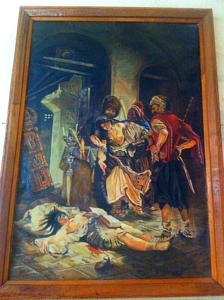
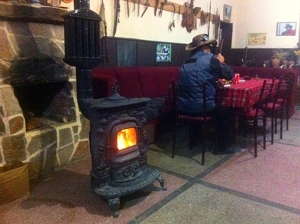
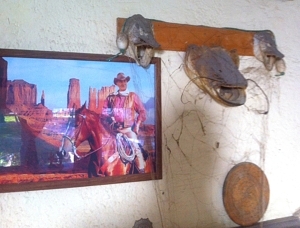
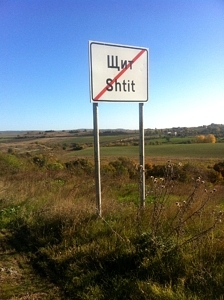
Until recently there were ‘hundreds’ of Syrians, Eritreans and Afghans making there way through his village, M tells me. He would often give them lifts to Svilengrad near the Turkish border. ‘Police sometimes beat them up, steal their cash and dump them back on the Turkish side,’ he adds. ‘They broke the legs of a couple of guys and they later froze to death. And an Afghan was shot and killed. But these things are rarely reported in the press.’
I look up the incidents later. The first involved two Iraqi Yazidis fleeing ISIS and was reported in March 2015 by the Bulgarian Helsinki Committee. In the second, the man was allegedly killed after resisting arrest on 15th October. A little more googling pulls up more disturbing information. A recent joint report by the Belgrade Center for Human Rights and Oxfam found that all 110 refugees consulted for the study reported some form of violence or extortion by the Bulgarian police. In response, the Bulgarian Interior Ministry accused the NGOs of using ‘flawed research methods’ and suggested refugees may be lying to avoid being returned to Bulgaria.
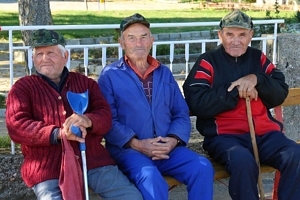
And their menfolk watching the world go by nearby.
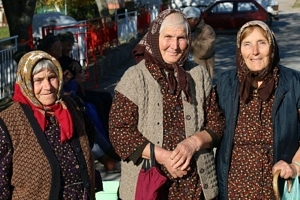
Locals in Shtit enjoying a sunny car boot sale as I leave at 7am.
M offers me a lift to Elhovo and I readily accept. And it’s fortunate I do as it turns out the bridge I was intending to take has collapsed. All infrastructure here is terrible, he tells me. ‘All the EU grant money goes into MPs’ back pockets.’
I intend to visit the refugee centre in Elhovo, but am denied entry twice and told to ‘come back tomorrow’. The building is a huge concrete block, hemmed in by a metal fence with minimal outdoor space. Its entrance is littered with rubbish, while washing lines sag cheerlessly across the windows. Unlike Harmanli, residents here are locked inside. What would I find in there, I wonder? What are they hiding?
On my way back, I pop into the tourist office. The woman there tells me there’s no problem with crime in the Roma community, and most of them work in construction or other manual labour jobs. I go to visit them out of curiosity and discover a ramshackle semi-shantytown full of half-built houses and scrawny goats chewing on trash. The residents at first eye me with suspicion, but soon soften after a few handshakes and exclamations of ‘Eengland, tourist!’ (for some reason I think stressing the first vowel is helpful in situations like this). They give me tea and a tour of the area, and I snap pics of a few young male posers: a consistent breed across the socio-economic spectrum.
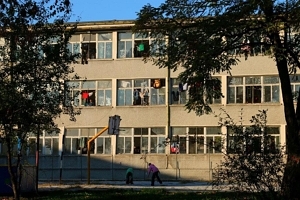
The refugee camp in Elhovo, where residents are locked inside.
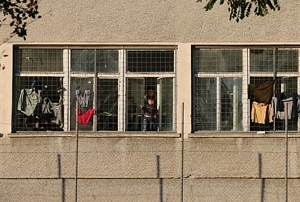
A little boy stands in the window of the camp staring out through the wire mesh.
The next day, I head for the Turkish border. As the edge of Europe approaches, ominous signs crying ‘danger zone!‘ flash up on my right. Is it, I wonder? I’ve never been to Turkey before, and certainly not on a bike. What dangers may or may not lie in store, I have absolutely no idea. But I am very excited to find out. And just a tiny bit terrified. To be continued…
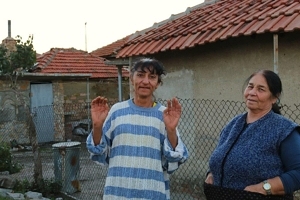
Roma people in Elhovo
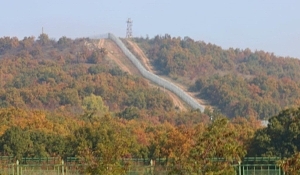
The 30km barbed wire fence between Bulgaria and Turkey to keep refugees out of Europe.
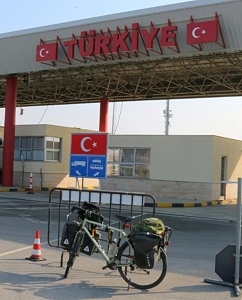
The Turkish border, hooray!
Follow my journey on Twitter at reo_lowe or Facebook at facebook.com/bexbicyclediaries.


andrew mackay
Posted at 17:35h, 14 AugustVery interesting reading, well done, you are brave. Following the diary avidly. Good searching. Andrew
reol8
Posted at 18:03h, 14 AugustThanks so much for reading and taking the time to comment, Andrew – much appreciated! Great to have your support x
Claire
Posted at 20:13h, 14 AugustI’ve met a lot of Hs in London… Enjoying the blog a lot!
reol8
Posted at 09:52h, 16 AugustYes, they tend to get around, don’t they? Thanks for reading, Claire! x
Dick Joyce
Posted at 17:59h, 15 AugustThe nitty-gritty. Bulgaria. How did you survive? ‘Enshala’. Fantastic tale. Where, by the way, is the picture (see below) of the bosomy women? Look forward to reading further adventures of my heroin.
Dick
reol8
Posted at 09:59h, 16 AugustThe bosoms are to be located directly below the shepherds and to the left of the cowboy. Sadly they’re not as large or numerous as I would have liked (there were about three other pairs on display), but I was working under pressure. Hard to know the etiquette re unsolicited bosom-photography in a place like Shtit, so keen to avoid detection. Will try to make up for it later. Much love! Bex x
Ben Lowe
Posted at 15:08h, 23 AugustBex
You have the nose of a journalist, the eye of a traveller, and the pen of a true writer. Added to this, your sharp wit and a beautifully-honed economy of style make for riveting reading. The edge-of-the-seat moments are taken just to the right point of tension, then you defuse with humour or self-mockery. You immerse yourself as you travel, always curious to understand the nuances of culture, tradition and the here and now, and not influenced by newspaper headlines or preconceptions. The whole is a fascinating insight into a region ravage by war and/or revolution past and present, but where people still seek to make something of their lives, whatever the obstacles. Brilliant. Ben
reol8
Posted at 17:00h, 31 AugustWow, what can I say? Thank you for such a wonderful comment, it really means the world to me (I should probably add the disclaimer here that you’re a blood relation – but that’s surely by the by). Am so happy they’re not deathly dull for you and you’re getting something out of them – gives me a real boost to go on. Thank you again! Much love, Bex x
Jamie Baughan
Posted at 18:47h, 30 AugustThis Blog is brilliant. I’m really enjoying the tales of your bummel Bex. Can’t wait for the next instalment.
reol8
Posted at 17:14h, 31 AugustThanks JB! Really appreciate you reading & responding – means a lot x
EDV-Berater
Posted at 12:55h, 04 NovemberRealy nice. You have done an excellent job here.